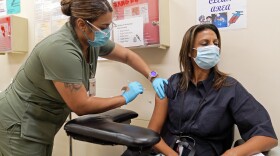-
COVID is surging, but new vaccines have been approved. Here’s what to know
-
The Ohio Department of Health is tracking both the mosquito-borne West Nile virus and COVID.
-
-
Health, Science & Environment
-
-
People who test positive need to isolate themselves for 5 days if they don't show symptoms. The change reflects "what we know about the spread of the virus" and vaccine protection, the CDC chief says.
-
Travelers continue to deal with flight disruptions during the most recent COVID surge.
-
Rapid at-home COVID tests are in short supply after holiday gatherings and a nationwide test shortage. Public libraries have been handing out those test kits but they are going out the door as soon as supply comes in.
-
The omicron variant has COVID cases in Ohio climbing at a pace not seen since last January, causing more event cancellations. Ohio State has canceled the men’s basketball game scheduled for Tuesday. The NHL has also canceled Tuesday’s Blue Jackets game.
-
It's been another tough year for the state as more Ohioans have died from COVID-19 this year than in 2020.
-
More than 1,400 flights canceled worldwide Monday, adding to thousands canceled over the Christmas weekend. And across the country, long lines continued at COVID-19 testing sites.
-
UCLA, Virginia, Boston College and Miami bow out of their bowl games because of an insufficient number of players. Rosters also are depleted by injuries and players opting out of games.
-
Americans are scrambling to find out if they're COVID-free so they can go through with their plans. But for many, that means queuing up for hours or tracking down scarce at-home testing kits.
-
A hospital leader said doctors and nurses are dealing with increased encounters with family members and loved ones of patients.
-
The medicine, called molnupiravir, is taken twice a day for five days and works by preventing the virus from replicating. Merck says it will have 10 million packs available by the end of the month.
Latest Coronavirus Stories
-
Health, Science & EnvironmentOhio Department of Health Director Dr. Bruce Vanderhoff says COVID-19 rates have increased in recent weeks, but they are increasing from historically low levels.
-
Health, Science & EnvironmentA new respiratory syncytial virus vaccine approved by the FDA Monday is now being recommended by the CDC and could be available by mid-October.
-
After vaccines became widely available in 2021, "the excess death rate among Republican voters was 43% higher than the excess death rate among Democratic voters," Yale researchers say.
-
Health, Science & EnvironmentThe federally funded Pandemic-Electronic Benefit Transfer program was created to support families who count on free and reduced-cost lunch programs when schools went virtual in 2020. The program ends with the current school year.
-
Health, Science & EnvironmentThe fears of a "triple threat" of the three respiratory viruses hitting all at once in Ohio may have subsided, but health officials say there’s still concern about the future when it comes to COVID, the flu and RSV.
-
Advisers to the U.S. Food and Drug Administration today endorsed a proposal to make big changes in the nation's approach to vaccinating people against COVID-19.
-
Health, Science & EnvironmentThe new approach would simplify vaccination guidance so that, every fall, people would get a new shot, updated to try to match whatever variant is dominant.
-
The expiration date printed on the free COVID-19 test distributed by the federal government may not be telling the full story. The FDA earlier this year approved a request from the manufacturer to extend expiration dates.
-
Updated COVID boosters are now available for anyone age 12 or older. The CDC is urging anyone who is eligible to sign up but some vaccine experts say some people might want to wait.
-
Pfizer has submitted data on its bivalent COVID-19 booster shot that specifically targets the latest omicron subvariants. If authorized, the company says the shots could be ready as soon as September.


























